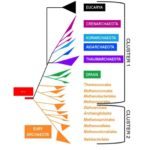Link to Pubmed [PMID] – 28777382
Link to HAL – pasteur-02445405
Link to DOI – 10.1038/ismej.2017.122
ISME Journal, 2017, 11 (11), pp.2407-2425. ⟨10.1038/ismej.2017.122⟩
The Archaea occupy a key position in the Tree of Life, and are a major fraction of microbial diversity. Abundant in soils, ocean sediments and the water column, they have crucial roles in processes mediating global carbon and nutrient fluxes. Moreover, they represent an important component of the human microbiome, where their role in health and disease is still unclear. The development of culture-independent sequencing techniques has provided unprecedented access to genomic data from a large number of so far inaccessible archaeal lineages. This is revolutionizing our view of the diversity and metabolic potential of the Archaea in a wide variety of environments, an important step toward understanding their ecological role. The archaeal tree is being rapidly filled up with new branches constituting phyla, classes and orders, generating novel challenges for high-rank systematics, and providing key information for dissecting the origin of this domain, the evolutionary trajectories that have shaped its current diversity, and its relationships with Bacteria and Eukarya. The present picture is that of a huge diversity of the Archaea, which we are only starting to explore.



